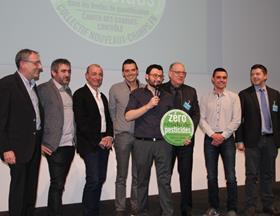
Fruit and vegetable producers across France have launched a new label guaranteeing the consumer a product free of pesticide residues. The new logo will appear on all fruit and vegetables containing no more than 0.01mg per kilo, the lowest quantifiable level, with independent tests conducted by Capinov Laboratoire and certified by Cofrac.
The process commenced last year with the launch of Paysan de Rougeline's zero-residue tomatoes and strawberries. Since this time, more companies, from different regions of France and producing different items, have joined the collective, including Blue Whale, an apple exporter located in Montauban; Océane, a Nantes-based cooperative growing tomatoes, cucumbers, lamb's lettuce and leeks; potato specialist Pomme Alliance from Orly; Larrère, a Landes-based carrot producer; Fruits et Compagnie, growers of stonefruit and topfruit in the Gard; and Lindor, a producer of golden apples in the Limousin.
Companies belonging to the collective, dubbed Nouveaux Champs, already represent 10 per cent of French consumption, with a view to growing that proportion to 20 per cent within five years.
This year, 300,000 tonnes of fruit and vegetables are expected to be sold under the label, totalling 11 kinds of vegetable (including asparagus, onions, garlic, shallots and cress) and 12 fruits (including bananas, strawberries, raspberries, figs, kiwifruit, melons and mini-watermelons).
Achieving the target of zero pesticide residues is more costly for producers and involves more risk, requiring the use of resistant varieties, good agricultural practices, adapted production equipment, integrated biological protection and the management and enrichment of natural flora and fauna. For this reason, products bearing the label will command a premium.
“Consumers are increasingly concerned about their health,” said Rougeline MD Gilles Bertrandias at the label’s launch at Fruit Logistica. “A high percentage view food as a possible cause of unhealthiness, and many point their finger at pesticides.”
Some critics have argued that, to respond in such a way to suggestions that produce containing residues under the legal maximum level is unsafe, risks diminishing the perception of all non-zero-residue produce. However, Bertrandias believes that the key will be in how the label is communicated.
“Everyone involved has a big responsibility in communicating the idea of this label to their customers,” he says. “We need everyone to get behind this in order to make it a success.”



